
Depot Vs. Oral Antipsychotic Efficacy
A recent paper has been published in JAMA Psychiatry. It compares the efficacy of different antipsychotic medications, and the route by which they’re given, and I believe it’s reserach that’s well-worth knowing about. If you would like to see the article first-hand, there is a link to it at the bottom of this page. However, …

Diabetes Mellitus: Part 1 – Understanding Glucose and Insulin
In a previous blog post, I explained the relevance of metabolic syndrome to mental health nursing. Elevated fasting blood glucose is a diagnostic criterion of metabolic syndrome, and is caused by a steady increase in insulin resistance. Without intervention or a change in lifestyle, this is likely to develop into Type 2 Diabetes Mellitus (DM2). But what exactly does …

Serious Adverse Effects: Metabolic Syndrome
Metabolic syndrome puts a name to a phenomenon we will all be familiar with as RMNs. It’s both a life-threatening and commonplace adverse effect of commonly-used mental health medications. However, nurses can encourage a range of interventions to significantly reduce the likelihood of it developing. In other words, RMNs need to know about metabolic syndrome. …

Electrocardiograms
Mental health service users are more likely than the general population to experience cardiovascular disease. This may be due to ischaemic events through stress or an unhealthy lifestyle, or they can arise from drug-induced QT interval prolongation. As a result, RMNs are likely to encounter service users who require an electrocardiogram (ECG). This post provides …

Serious Adverse Effects: Neuroleptic Malignant Syndrome
Learn about the signs and symptoms of Neuroleptic Malignant Syndrome (NMS), what causes it, who is most at risk from developing it, how to manage it, and what it has to do with the purple patches in the picture here. Imagine this scenario: There has been a new admission to an acute ward. The service …

Serious Adverse Effects: Acute Dystonic Reaction
You are probably very familiar with giving PRN Procyclidine to help patients with extrapyrimidal side effects… but it is worth knowing that occasionally dystonic reactions can be so severe, they can be life-threatening. This post should help you: Identify those most at risk of acute dystonic reaction Understand and identify what are the most life-threatening …
